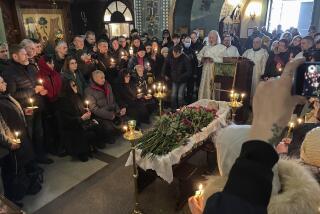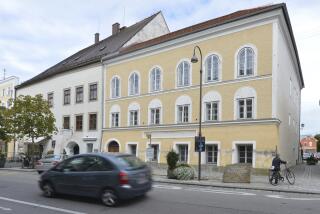Hess Buried in Secret to Bar Neo-Nazi Rally
- Share via
WUNSIEDEL, West Germany — Adolf Hitler’s deputy, Rudolf Hess, has been buried in secret at an undisclosed location to prevent his funeral from being turned into a neo-Nazi rally, his family disclosed Monday.
Allied authorities in West Berlin, meanwhile, reacting to doubts expressed by the family over Hess’ death Aug. 17, issued a statement saying that Hess hanged himself with an electrical cord in the Spandau prison for war criminals.
The surprise announcement of the burial was made at a news conference in Wunsiedel that originally was planned to disclose the time of the public funeral here of the 93-year-old Hess.
“He has been buried quietly,” said the statement, read by Wunsiedel Mayor Karl Walter and signed “The Hess family.”
Walter and the family refused to disclose the time and location of the burial. But the mayor said the site was “definitely not” in his village.
The family said that events in Wunsiedel, under virtual siege by police who have sealed off the cemetery and cordoned off approach roads to keep out hundreds of neo-Nazis, had made a ceremony at the family grave impossible.
Only hours before, family lawyer Alfred Seidl said in Munich that Hess’s 49-year-old son, Wolf-Ruediger, who had expressed doubts about Allied statements that Hess killed himself, suffered a stroke and was in intensive care.
The Allied statement, issued by the three Western powers--Britain, the United States and France--said for the first time that Hess had hanged himself. The Soviet Union, which had vetoed several requests by its wartime Allies to release Hess, did not endorse the statement.
At a news conference in Munich earlier, Seidl repeated his doubts over the suicide and said he is waiting for the result of a second autopsy ordered by the family.
Neo-Nazis, seizing on the doubts expressed by Wolf-Ruediger and Seidl, have accused the Allies of murdering Hess. But Seidl angrily denied that the family had sought to turn Hess into a martyr.
“If any legends are formed or a martyr is made of Rudolf Hess, then blame is not to be found with the family or anyone in West Germany,” said Seidl, who defended Hess at the 1946 Nuremberg war crimes trials. “The blame of this would fall on the four (Allied) powers, who refused to release Rudolf Hess and allow him to die among his family,” he said.
An Allied official in West Berlin said Hess hanged himself at the prison, where he had spent nearly 41 years, by using a cord of a reading lamp tied to a window frame. Hess tied one end of the electrical cord into a noose, put it over his head and threw himself to the floor, the official said.
More to Read
Sign up for Essential California
The most important California stories and recommendations in your inbox every morning.
You may occasionally receive promotional content from the Los Angeles Times.













